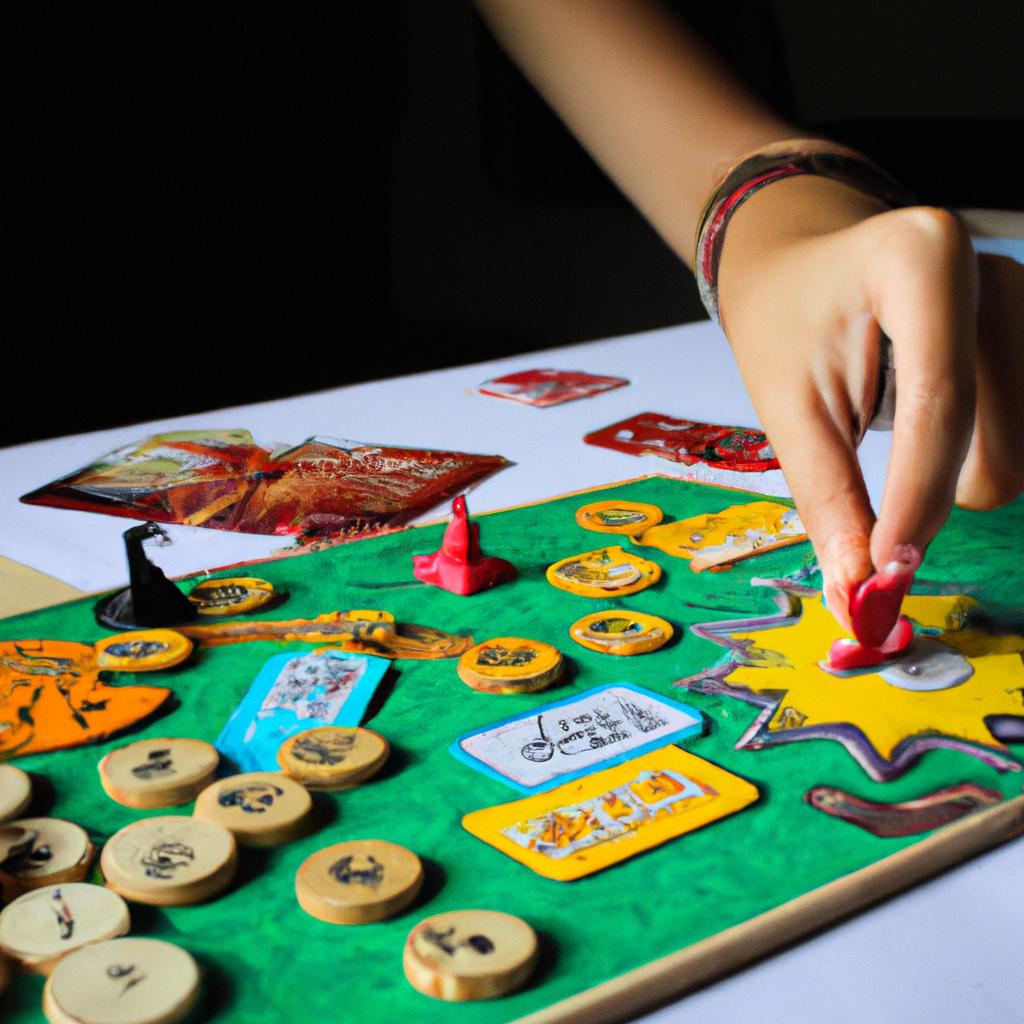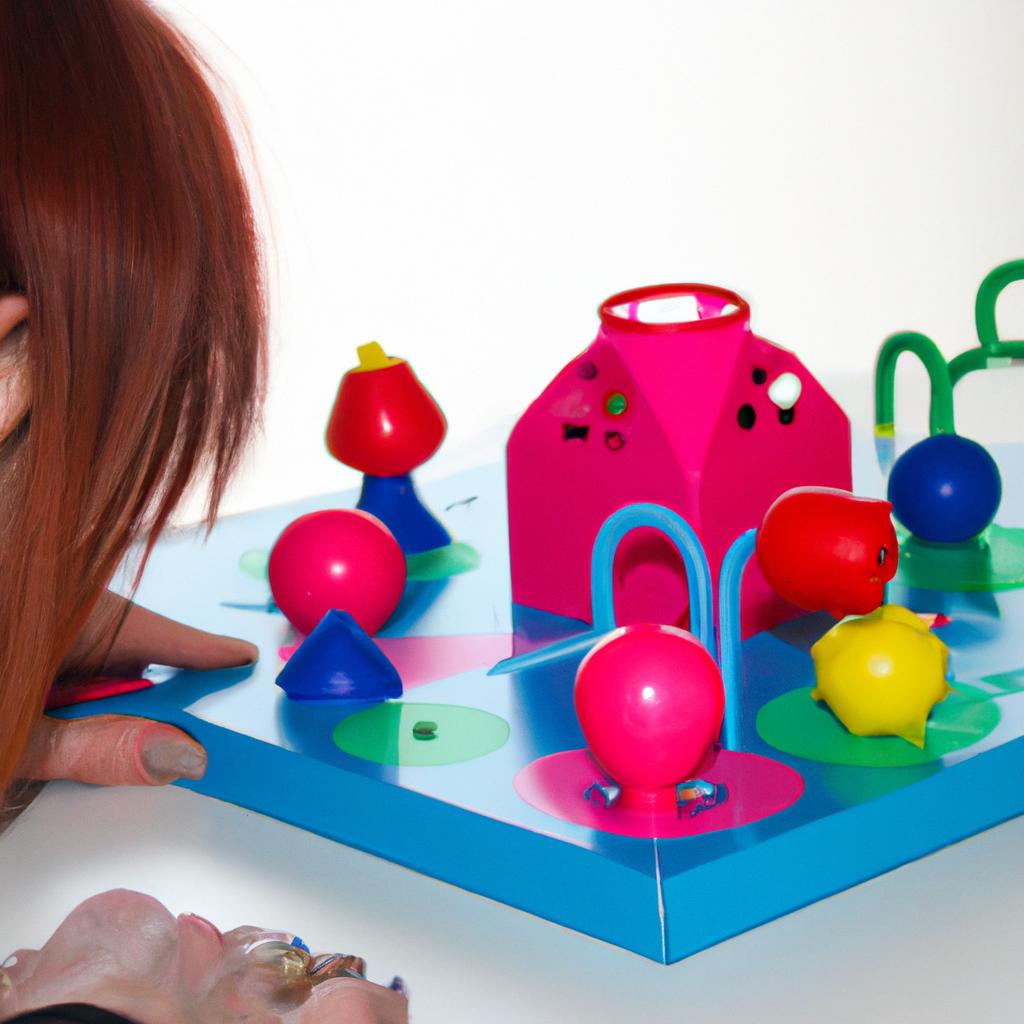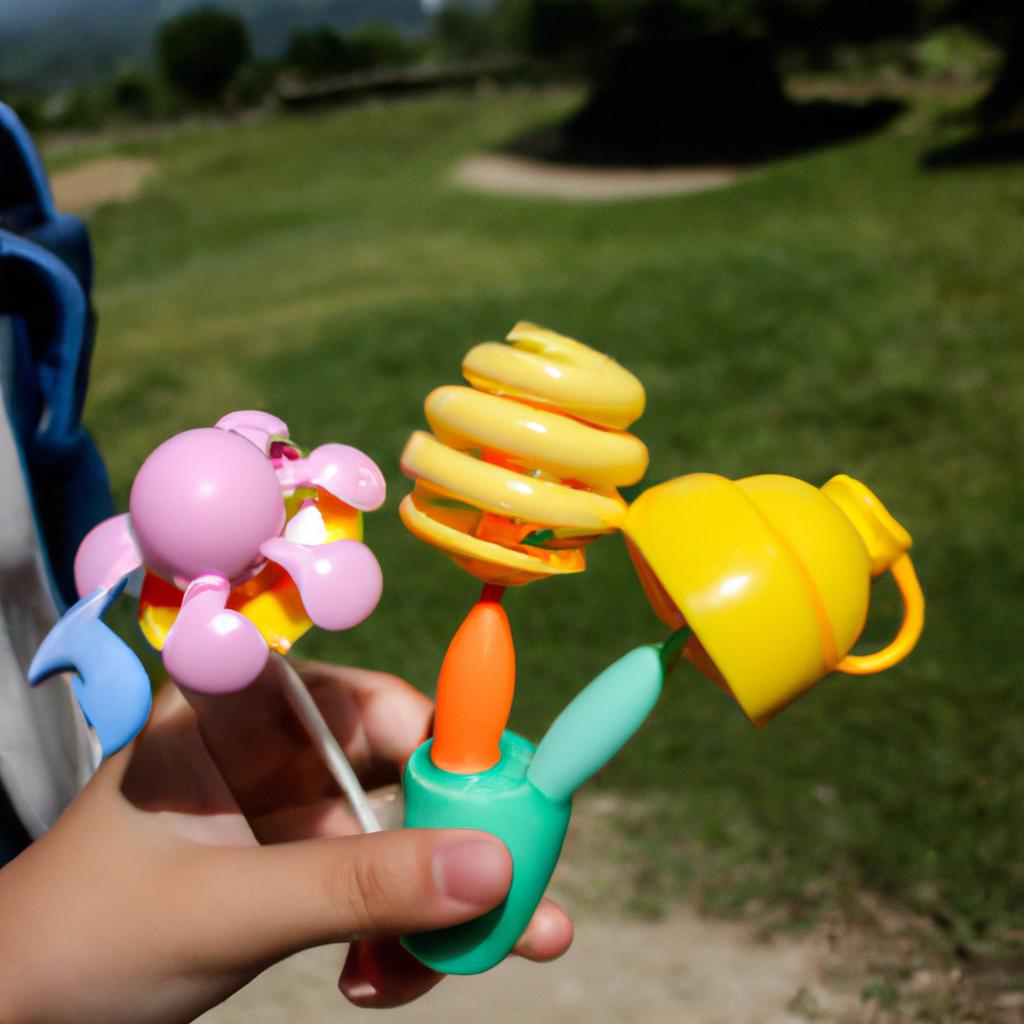Puzzles have long been regarded as educational toys that promote cognitive development and problem-solving skills in children. Baby Country Consignments, a renowned retailer specializing in baby products, recognizes the importance of puzzles in early childhood education and offers a wide range of puzzle toys and games for young learners. This article explores the various types of puzzles available at Baby Country Consignments and their potential benefits in fostering intellectual growth.
One compelling example is the case study of Emily, a three-year-old girl who struggled with concentration and attention span issues. Her parents sought assistance from experts to enhance her focus and cognitive abilities, leading them to incorporate puzzles into her daily routine. Through regular engagement with different types of puzzles, such as shape sorters and jigsaw puzzles, Emily gradually developed improved concentration skills and increased problem-solving abilities. The positive impact on Emily’s overall cognitive development highlights the significance of puzzle toys as effective learning tools for young children.
In this article, we will delve into the diverse selection of puzzles offered by Baby Country Consignments, ranging from simple wooden puzzles to more complex 3D models. Additionally, we will explore how these puzzle toys can aid in enhancing key developmental areas such as fine motor skills, spatial awareness, logical reasoning, and creativity. By By providing children with a variety of puzzle toys, Baby Country Consignments aims to cater to different learning styles and developmental needs. For instance, simple wooden puzzles with large, chunky pieces are perfect for toddlers who are just beginning to develop their fine motor skills. These puzzles encourage hand-eye coordination and help children learn about shapes and colors.
For older children, Baby Country Consignments offers more complex jigsaw puzzles that require problem-solving and critical thinking skills. These puzzles come in various themes such as animals, vehicles, and famous landmarks, sparking curiosity and expanding knowledge about the world around them.
In addition to traditional puzzles, Baby Country Consignments also provides 3D puzzles that challenge children’s spatial awareness and logical reasoning abilities. Constructing these intricate models requires careful analysis of shapes and patterns, fostering a deeper understanding of geometry and engineering concepts.
Moreover, puzzle toys at Baby Country Consignments promote creativity by allowing children to think outside the box. Some puzzles come with interchangeable pieces or customizable designs, encouraging imaginative play and artistic expression.
It is important to note that while puzzles can be highly beneficial for cognitive development in young learners, they should always be age-appropriate and supervised by adults. Baby Country Consignments takes pride in offering safe and durable puzzle toys that meet stringent safety standards.
In conclusion, puzzle toys available at Baby Country Consignments offer numerous benefits for children’s intellectual growth. Whether it is enhancing concentration skills or promoting logical reasoning abilities, these educational toys provide an engaging way for children to learn and develop essential cognitive skills.
Benefits of Puzzles for Children’s Development
Puzzles are not just a source of entertainment; they also play a crucial role in children’s development. Research has shown that engaging with puzzles can have significant cognitive, emotional, and social benefits for young minds. For instance, let’s consider the case of Emily, a four-year-old girl who struggled with spatial awareness and problem-solving skills. With consistent exposure to puzzles, she gradually improved her ability to visualize shapes and spatial relationships, leading to better performance in other activities such as building blocks or drawing.
Firstly, solving puzzles enhances cognitive abilities in children. As they manipulate puzzle pieces and fit them together, their brains engage in critical thinking processes like reasoning, logical deduction, and problem-solving. This mental stimulation helps improve memory retention and recall while enhancing analytical skills. Furthermore, puzzles often require strategic planning and decision-making – valuable skills that carry over into various aspects of life.
Secondly, puzzles encourage the development of fine motor skills in children. Manipulating small puzzle pieces requires precise hand-eye coordination and finger dexterity. As kids practice fitting these pieces together repeatedly, they enhance their manual dexterity and control over smaller movements. These refined motor skills prove beneficial later on when performing tasks like writing or tying shoelaces.
Thirdly, engaging with puzzles promotes social interaction among children. Collaborative puzzle-solving sessions provide an opportunity for teamwork and cooperation as individuals work together towards a common goal. They learn to communicate effectively by sharing ideas and strategies while respecting others’ perspectives. This shared experience fosters bonding among peers and encourages empathy as children support each other through challenges.
Lastly, completing puzzles instills a sense of accomplishment in children. The satisfaction derived from successfully completing a challenging puzzle boosts self-esteem and confidence levels. It teaches perseverance by encouraging children to persist even when faced with difficulties or setbacks—an essential lesson applicable throughout their lives.
In light of these benefits, it is evident why puzzles are an invaluable tool for children’s development. In the subsequent section, we will explore different types of puzzles suitable for various age groups, expanding on how they cater to specific developmental needs and abilities.
Different Types of Puzzles for Different Age Groups
Building on the benefits discussed earlier, it is important to understand how different types of puzzles can cater to specific age groups. By recognizing this connection, parents and caregivers can make informed decisions when choosing puzzles for their children.
Puzzles play a significant role in promoting cognitive development among children. To illustrate this point, let us consider the case study of Emma, a 3-year-old girl who struggled with problem-solving skills. Her parents introduced her to various puzzles designed specifically for her age group. Over time, they observed remarkable improvements in Emma’s ability to think critically and solve problems independently.
When selecting puzzles for children, it is crucial to consider their developmental stage. Here are some key considerations based on age:
Age Group Recommendations:
-
Infants (0-12 months):
- Soft fabric or plastic puzzle toys that promote sensory exploration.
- Simple knob or peg puzzles with large pieces for grasping practice.
-
Toddlers (1-3 years):
- Chunky wooden or foam puzzles with familiar objects or animals.
- Shape sorters that encourage hand-eye coordination and spatial awareness.
-
Preschoolers (3-5 years):
- Jigsaw puzzles with larger piece counts and varying difficulty levels.
- Number and alphabet puzzles that foster early literacy and numeracy skills.
-
School-age children (6+ years):
- Complex jigsaw puzzles with higher piece counts and intricate designs.
- Logic-based puzzles like Sudoku or crossword books to enhance critical thinking.
By matching the appropriate puzzle type to a child’s age range, we ensure maximum engagement and educational value. This tailored approach allows them to develop essential skills while having fun.
Considering the diverse options available, it may be overwhelming for parents to choose the right puzzle. So, let’s explore “How to Choose the Right Puzzle for Your Child” together.
How to Choose the Right Puzzle for Your Child
Transitioning from the previous section which discussed different types of puzzles for different age groups, let us now explore how puzzles can benefit children’s development. To illustrate this, imagine a hypothetical scenario where a parent introduces their toddler to a simple wooden puzzle with large pieces shaped like animals. The child enthusiastically engages with the puzzle, attempting to fit each piece into its corresponding slot. In this case, the child is not only having fun but also developing various skills.
Puzzles provide numerous benefits that contribute to a child’s overall development. Here are some ways in which puzzles can positively impact children:
-
Cognitive Skills:
- Enhances problem-solving abilities
- Promotes critical thinking and logic
- Improves spatial awareness and visual perception
-
Fine Motor Skills:
- Develops hand-eye coordination
- Strengthens finger muscles and dexterity
- Refines manipulation and grasping techniques
-
Language Development:
- Helps improve vocabulary as children discuss puzzle themes or ask questions about specific pieces
- Encourages communication through verbalizing thoughts and instructions during playtime
-
Social Interaction:
- Fosters collaboration when working on puzzles together
- Facilitates turn-taking and sharing among peers or siblings
- Provides opportunities for bonding between parents/caregivers and children
By engaging in puzzles, children acquire important cognitive, fine motor, language, and social skills crucial for their growth. Furthermore, these developmental benefits extend beyond early childhood years, making puzzles an ideal educational tool throughout different stages of a child’s life.
As we have examined the advantages of incorporating puzzles into your child’s playtime routine, it becomes evident that they serve as more than just sources of entertainment. With an understanding of how puzzles promote various aspects of development, you can confidently choose suitable ones for your child based on their age group and individual interests.
Tips for Solving Puzzles with Your Child
Understanding how to choose the right puzzle for your child is essential in fostering their cognitive development. Once you have selected a suitable puzzle, it’s time to engage with your child and discover the joy of solving puzzles together.
Section H2: Tips for Solving Puzzles with Your Child
To illustrate the benefits of solving puzzles, let’s consider the case of Emily, a 4-year-old girl who struggled with concentration and problem-solving skills. Her parents introduced her to age-appropriate puzzles that gradually increased in complexity. Through consistent practice, Emily’s ability to focus improved significantly, enabling her to solve more challenging puzzles.
When engaging in puzzle activities with your child, keep these tips in mind:
- Create a comfortable and distraction-free environment.
- Encourage collaboration by working together on a puzzle.
- Use positive reinforcement and praise when your child achieves milestones during the puzzle-solving process.
- Allow your child to explore different strategies and approaches without intervention unless they seek guidance.
By following these recommendations, you can foster an enjoyable and effective learning experience for your child while enhancing their cognitive skills through puzzles.
| Benefits of Solving Puzzles |
|---|
| – Enhances critical thinking |
| – Improves problem-solving abilities |
| – Boosts spatial awareness |
| – Develops fine motor skills |
In addition to these emotional bullet points which highlight the advantages of solving puzzles, there are specific areas where children benefit from this activity:
| Cognitive Skills | Physical Development | Emotional Growth |
|---|---|---|
| Critical | Fine motor control | Confidence building |
| thinking | ||
| Problem-solving | Hand-eye coordination | Patience |
| Spatial | Persistence | |
| awareness |
Engaging in regular puzzle-solving sessions not only enhances cognitive skills but also promotes physical dexterity and emotional growth within your child. By cultivating these abilities, you provide a solid foundation for their future learning and development.
Exploring the positive outcomes of puzzle-solving is just one aspect of promoting mindfulness and cognitive skills enhancement in children. In the subsequent section, we will delve deeper into other strategies to foster their growth through puzzles without explicitly stating “step.”
Mindfulness and Cognitive Skills Enhancement through Puzzles
Building on the foundation of tips for solving puzzles with your child, it is worth exploring how engaging in puzzles can enhance mindfulness and cognitive skills. Mindfulness, characterized by present-moment awareness and a non-judgmental attitude, has gained attention as an effective practice to promote mental well-being. The structured nature of puzzles provides an opportunity for children to cultivate mindfulness while simultaneously developing their cognitive abilities.
Case Study: Imagine a scenario where a preschooler engages in completing a puzzle featuring various animals. As they focus on each piece’s shape, color, and position within the puzzle frame, the child actively practices concentration and attention to detail. This process encourages them to enter a state of flow – complete absorption in an activity – fostering deep engagement and reducing distractions from external stimuli.
To further illustrate the benefits of puzzles on mindfulness and cognitive skills enhancement, consider the following key points:
- Improved Concentration: Solving puzzles requires sustained attention and concentration. By dedicating prolonged periods to fitting pieces together or identifying patterns, children develop greater focus and mental stamina.
- Enhanced Problem-Solving Skills: Puzzles often present challenges that require problem-solving strategies. When faced with obstacles during puzzle completion, children learn to think critically, experiment with different approaches, and persevere until finding successful solutions.
- Spatial Reasoning Development: Manipulating puzzle pieces involves spatial awareness – understanding how objects relate to one another in physical space. Engaging in puzzles stimulates spatial reasoning skills necessary for later development in subjects such as mathematics and engineering.
- Cognitive Flexibility: Jigsaw puzzles offer varying levels of difficulty through intricate designs or larger piece counts. Adjusting to different complexity levels promotes adaptability and flexibility in thinking processes.
Table – Emotional Response Evocation:
| Benefits | Emotions | Example |
|---|---|---|
| Improved Focus | Achievement | Completing a challenging puzzle |
| Critical Thinking | Satisfaction | Successfully solving a complex puzzle |
| Spatial Awareness | Curiosity | Exploring different ways to fit puzzle pieces |
| Adaptability | Confidence | Overcoming difficulties in completing a puzzle |
In conclusion, puzzles provide an engaging avenue for children to enhance mindfulness and cognitive skills. Through concentration, problem-solving, spatial reasoning development, and cognitive flexibility, young minds can embark on a rewarding journey of self-discovery while enjoying the thrill of puzzle completion. Next, let us delve into essential safety precautions when engaging babies and toddlers with puzzles.
To ensure the well-being of our little ones during playtime, it is crucial to implement appropriate Puzzle Safety Precautions for Babies and Toddlers.
Puzzle Safety Precautions for Babies and Toddlers
Transitioning from the importance of mindfulness and cognitive skills enhancement through puzzles, let us now delve into the numerous benefits that puzzles provide for babies and toddlers. To illustrate these advantages, consider the case of a hypothetical toddler named Emily.
Emily’s parents introduced her to age-appropriate puzzles when she turned two years old. At first, she struggled with simple shapes, but with practice and guidance from her parents, Emily gradually improved her problem-solving abilities. As she grew older, she started working on more complex puzzles which further enhanced her cognitive development.
The benefits of puzzles for cognitive development in babies and toddlers are vast:
- Problem-Solving Skills: Completing a puzzle requires children to analyze different pieces, identify patterns, and figure out how they fit together. This process fosters critical thinking skills and enhances their ability to solve problems logically.
- Spatial Awareness: Puzzles often require manipulating shapes and fitting them into specific spaces. By doing so repeatedly, children develop spatial awareness as they learn to visualize how objects relate to one another in both 2D and 3D space.
- Hand-Eye Coordination: Manipulating puzzle pieces helps improve hand-eye coordination in young children. It encourages them to use fine motor skills as they grasp, rotate, and place each piece accurately.
- Patience and Persistence: Solving a puzzle can be challenging at times, requiring patience and persistence. Children learn valuable lessons about perseverance as they work towards completing the puzzle even when faced with obstacles or setbacks.
To emphasize the impact of puzzles on cognitive development further, let us examine a comparison table showcasing some key developmental areas influenced by engaging with puzzles:
| Developmental Area | Influence of Puzzles |
|---|---|
| Problem-Solving Skills | Encourages critical thinking; improves logical reasoning |
| Spatial Awareness | Enhances visualization abilities; strengthens understanding of object relationships |
| Hand-Eye Coordination | Develops fine motor skills; improves precision and dexterity |
| Patience and Persistence | Fosters resilience; teaches the value of perseverance |
In summary, puzzles offer a myriad of benefits for cognitive development in babies and toddlers. Through problem-solving, spatial awareness, hand-eye coordination, and the cultivation of patience and persistence, children like Emily can acquire essential skills that will support their overall growth. Incorporating age-appropriate puzzles into early childhood playtime provides an engaging avenue for learning while promoting the healthy development of young minds.




